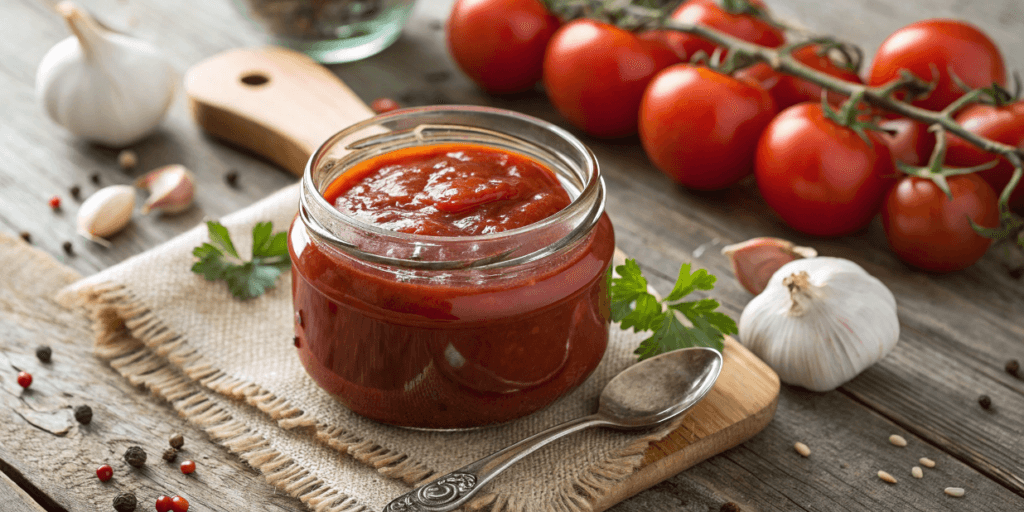There’s something special about making condiments from scratch. And when it comes to ketchup—the king of sauces—you might be wondering: Is it worth making homemade ketchup? Spoiler alert: it totally is.

Homemade ketchup is richer, fresher, and more flavorful than most store-bought brands. It’s also free from preservatives, high-fructose corn syrup, and excess sodium. If you’re looking for a way to elevate your burgers, fries, or sandwiches, this quick recipe is a great place to start.
Let’s dive into what goes into ketchup, how easy it is to make, and why it might just become your new favorite DIY staple.
Ingredients for Homemade Ketchup
This recipe uses simple pantry ingredients you likely already have on hand. It comes together in about 30 minutes and keeps for weeks in the fridge.
- 1 (6-ounce) can tomato paste
- ½ cup apple cider vinegar
- ¼ cup brown sugar
- ½ teaspoon garlic powder
- ½ teaspoon onion powder
- 1 teaspoon salt
- 1 cup water (adjust to preferred consistency)
- Optional: pinch of ground cloves, paprika, or cayenne for heat or depth
Step-by-Step Instructions
Step 1: Mix the Basics
In a medium saucepan, combine the tomato paste, apple cider vinegar, brown sugar, garlic powder, onion powder, and salt. Stir until smooth.
Step 2: Add Water and Simmer
Slowly add the water while stirring. Bring the mixture to a light simmer over medium heat.
Step 3: Let It Cook
Simmer uncovered for 20–25 minutes, stirring occasionally. This allows the flavors to meld and the texture to thicken.
Step 4: Taste and Adjust
Taste your ketchup. Want it sweeter? Add a touch more sugar. Prefer a deeper flavor? A small pinch of cloves or smoked paprika works wonders.
Step 5: Cool and Store
Remove from heat and let it cool. Transfer to a clean glass jar or airtight container. Refrigerate and use within a few weeks.
Expert Cooking Tips for Perfect Homemade Ketchup
- Go slow: Simmer gently to avoid burning or uneven texture.
- Use tomato paste: It gives the ketchup that deep, concentrated tomato flavor.
- Spice it your way: Want a smoky note? Add paprika. Craving heat? Try cayenne or chili powder.
- Strain it: For an ultra-smooth texture, run the finished ketchup through a fine mesh sieve.
Ingredient Substitutions
If you’re missing an ingredient or want to try a twist, here are some easy swaps:
- Brown sugar → Replace with honey or maple syrup for a natural sweetness.
- Apple cider vinegar → White vinegar or lemon juice are good alternatives.
- Onion/garlic powder → Use fresh minced garlic or onion for more punch.
Additional Info
| Detail | Info |
|---|---|
| Prep Time | 5 minutes |
| Cook Time | 25 minutes |
| Total Time | ~30 minutes |
| Servings | About 1½ cups |
| Storage | Refrigerate up to 3 weeks |
| Freezer Friendly | Yes – freezes well for 2–3 months |
According to the Mayo Clinic, avoiding high-fructose corn syrup in condiments may support better metabolic health. Homemade ketchup lets you skip it completely.
Nutritional Information (Per Tablespoon)
| Calories | Sugar | Sodium | Carbs |
|---|---|---|---|
| 15 | 3g | 110mg | 4g |
Please note, values are approximate and may vary depending on ingredients used.
Loved this recipe? There’s more waiting!
Check out Lime Velvet Cake or Knead Easter Bread and turn everyday meals into something special.
FAQs About Homemade Ketchup
What are the five main ingredients of ketchup?
The traditional base includes tomatoes (or paste), vinegar, sugar, salt, and spices. This recipe keeps it classic while being easy and approachable.
Is it worth making homemade ketchup?
Yes, it absolutely is! You’ll get better flavor, full control over ingredients, and no unnecessary additives.
What are the ingredients in ketchup sauce?
In this homemade version, you’ll use tomato paste, vinegar, sugar, salt, and a mix of spices like garlic and onion powder.
How long will homemade ketchup last?
Properly stored in the fridge, homemade ketchup will last for up to 3 weeks. You can also freeze it for longer storage.
Where does ketchup originate from?
According to Wikipedia, ketchup originally came from a fermented fish sauce in Southeast Asia before evolving into the tomato-based condiment we know today.
Give It a Try and Share Your Thoughts!
So, is it worth making homemade ketchup? If you value flavor, clean ingredients, and a quick kitchen win—yes, it is.
Give this recipe a try, and let us know how it turns out! Leave a comment or share your own tips. Homemade ketchup might just become your new go-to.
